Content
- What is Acute Renal Failure (ARF)
- Causes of Acute Renal Failure in a Woman
- Forms of acute renal failure
- Prerenal
- Renal
- Post-renal
- How ARF manifests itself, symptoms in a woman
- Diagnostics
- Lab tests
- Instrumental examination
- Acute renal failure treatment
- Drugs
- Procedures
- Diet
- Possible complications and consequences
- Acute renal failure video
Acute renal failure can be considered a clinically reversible syndrome. The appearance of characteristic symptoms in women is due to a violation of the functional activity of the paired organ. Treatment should be selected individually, depending on the age and condition of the patient and after instrumental and laboratory diagnostics.
What is Acute Renal Failure (ARF)
Acute renal failure (symptoms in women usually appear immediately) is a pathology that develops suddenly. The kidneys (one or both at the same time) lose the ability to perform filtration, excretory and secretory functions. There may be several reasons for the development of acute insufficiency. Often, pathology is diagnosed in women over 50 years of age.
The syndrome usually develops within a few hours. The glomerular filtration rate decreases several times, creatinine, urea and other nitrogenous metabolic products begin to accumulate in the kidneys. Pathology is classified depending on its form.
Causes of Acute Renal Failure in a Woman
There are several main reasons for the development of acute liver failure. They are classified depending on the shape of the arrester. Hemodynamic (prerenal) acute renal failure develops against the background of cardiogenic shock, arrhythmia, weakening of the myocardium or thromboembolism. Also, the syndrome is formed with a decrease in the amount of fluid in the body caused by burns, acute bleeding and severe diarrhea.
Parenchymal (renal) acute liver failure is usually triggered by ischemic or toxic damage to the parenchyma or inflammation of the kidneys. Poisoning with mercury, uranium, cadmium, copper salts and poisonous mushrooms is considered to be the reasons for the development of acute renal failure.
At risk are people taking uncontrolled sulfonamides, antibiotics and drugs that help reduce the growth of cancerous tumors. Parenchymal acute liver failure can develop as a result of alcoholic, narcotic coma, macrohemoglobinuria and blood transfusion of an incompatible group.
Obstructive or postrenal acute liver failure develops against the background of acute obstruction of the urinary system (prostate adenoma, urethritis, abdominal tissue damage). Also, ARF can develop with multiple trauma, sepsis, or post-traumatic shock.
Forms of acute renal failure
Acute renal failure (symptoms in women and men are about the same) requires immediate treatment.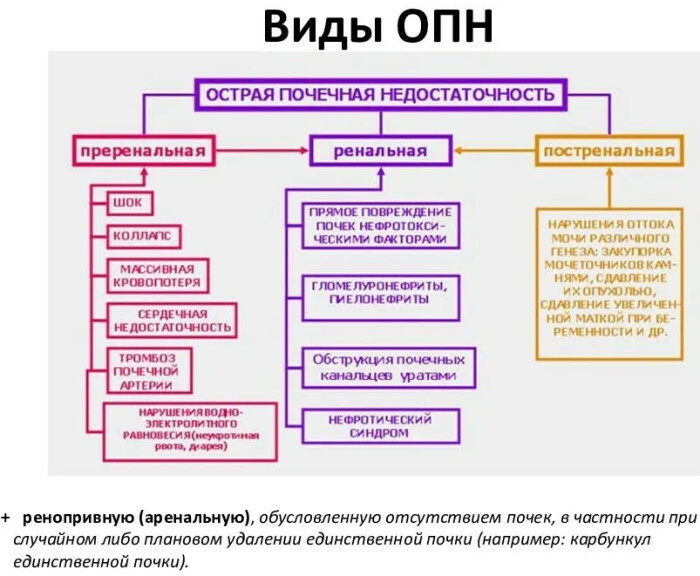
There are several main forms of surge arresters:
| Pathology form | Short description |
| Prerenal | Usually occurs with circulatory disorders. The condition is characterized by the development of various degenerative-destructive processes (decrease in urine density, urine output). |
| Renal | Formed when toxic substances enter the body. The syndrome is characterized by acute pain, indicating a lesion of the paired organ. The initial period of the renal form can last up to 72 hours. |
| Post-renal | A number of diseases can provoke the clinical syndrome. With postrenal ARF, there are problems with urinary outflow associated with its retention in the bladder. |
There are several main phases in the course of acute liver failure:
- Initial. Its duration is 24-72 hours. The symptom complex is usually nonspecific: patients complain of weakness, lack of appetite, bouts of nausea and slight drowsiness.
- Oligoanuric. In this phase, a decrease in the amount of urine is observed. Patients complain of vomiting, nausea and diarrhea. They are diagnosed with hyperphosphatemia, hyperkalemia, hypernatremia, metabolic acidosis, azotemia, and proteinuria. In the absence of timely and adequate treatment, the risk of coma is high.
-
Polyuric. The phase is characterized by an increase in the amount of urine (the volume may increase by 2-5 times). Potassium is rapidly washed out of the body, which leads to hypotension or incomplete paralysis. The density of urine is low, the content of urea and creatinine is minimal. The patient may suddenly faint.
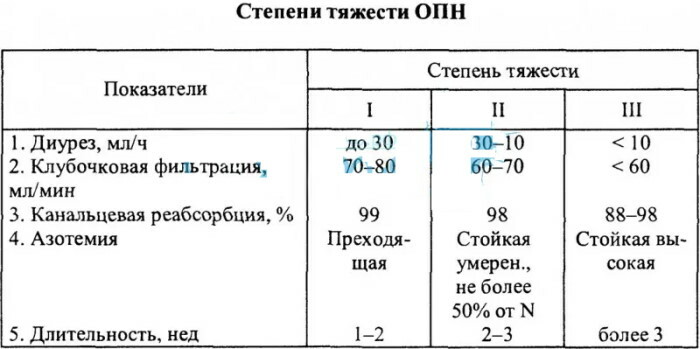
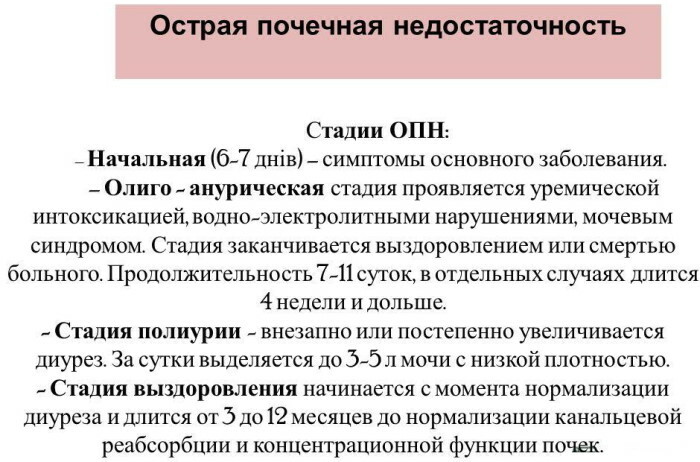
Patients with polyuric renal failure require long-term treatment (8-10 months).
Prerenal
The prerenal form of acute liver failure is accompanied by lesions of the central nervous system and the development of acute heart failure. Patients complain of shortness of breath, vomiting. The clinical syndrome is formed against the background of a slowdown in blood flow. Blood enters the kidneys in insufficient quantities, so the filtration pressure, as well as the filtration rate, decreases.
If blood flow is not restored within 60-120 minutes, then the risk of developing hyperkalemia and azotemia is high. With prerenal acute renal failure, there is a rapid excretion of potassium and sodium from the body and a violation of the water-electrolyte balance. This can lead to the development of severe intoxication, which is manifested by depression of consciousness (anxiety, irritability, collapse, fainting, coma).
The patient's heart rate drops and persistent hypertension develops. If you do not provide the patient with first aid, then asystole and alveolar pulmonary edema may develop.
Renal
The renal form of acute liver failure can develop when the poison of mushrooms, salts of heavy metals, acids and alkalis (including poisoning with vinegar essence) enter the body. Toxins affect the kidneys, initiating the formation of degenerative changes. At the initial stage of development of the renal form, patients complain of acute pain. The syndrome can persist for 48-72 hours.
Symptoms can only be controlled with medication. Palpation of the kidneys during this period is strictly prohibited. Nitrogenous toxins are determined in the blood. In the absence of adequate treatment, the patient's well-being is rapidly deteriorating.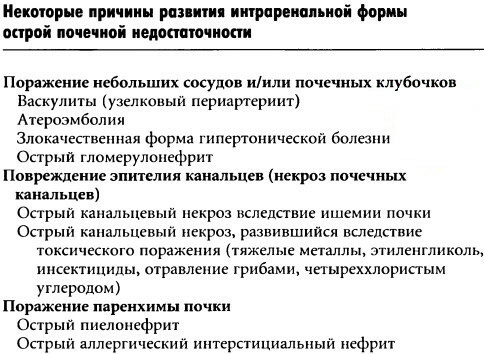
In addition to acute pain, he begins to complain of vomiting, shortness of breath and other signs of intoxication, indicating damage to the central nervous system. With the renal form of renal failure, the number of erythrocytes in the blood decreases, and the number of leukocytes, on the contrary, increases.
Post-renal
Acute renal failure of this type can be provoked by pathologies in which the outflow of urine is difficult. At the initial stage of the development of the disease, patients do not always go to the doctor - they prefer to endure the slight discomfort that occurs when the bladder is empty. To eliminate the characteristic signs of the disease, doctors often resort to palliative methods to restore the functional activity of the organs of the urinary system.
How ARF manifests itself, symptoms in a woman
The symptom complex may vary depending on the phase and shape of the arrester. Any, even minor discomfort that occurs when emptying the bladder (pain, burning, feeling of overcrowding) is a reason to contact the nearest medical facility.
Acute renal failure, symptoms in women are caused by the following:
- increase / decrease in daily urine output;
- weakness;
- drowsiness;
- apathy;
- pain in the lower abdomen (especially when urinating);
- hypotension;
- vomit;
- nausea;
- dizziness;
- short-term loss of consciousness;
- coma;
- incomplete (partial) paralysis;
- hypotension;
- blood pressure surges;
- increase / decrease in heart rate;
- diarrhea;
- dyspnea.
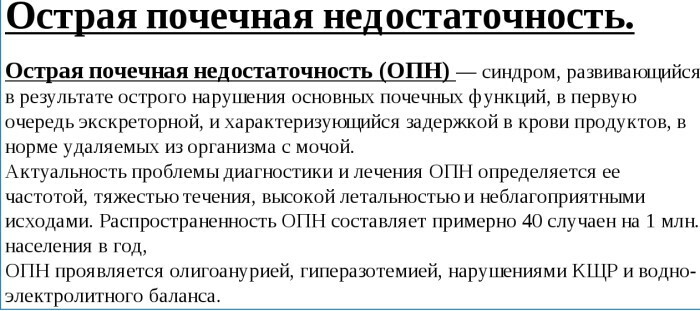
The main sign indicating the development of acute renal failure is a change in the volume of daily urine output.
Diagnostics
First of all, before the examination, the doctor should carefully listen to the patient.
Often, patients complain about:
- acute pain in the lumbar region and peritoneum;
- shortness of breath;
- drowsiness;
- lethargy;
- decrease or increase in daily urine output;
- vomiting;
- nausea;
- loss of appetite.
These symptoms may indicate the development of acute heart failure. Also, the nephrologist asks the patient about the presence of injuries, blood loss, chronic pathologies (pyelonephritis, diabetes mellitus) in history. A general examination consists of assessing the condition: the doctor measures blood pressure, heart rate and breathing rate. He also pays attention to the color of the skin and the patient's ability to concentrate. The doctor may palpate the kidneys through the abdomen and lower back.
Lab tests
If acute renal failure is suspected, the patient should be tested. Early in the morning, on an empty stomach, it is necessary to donate blood and urine in the laboratory. A complete blood count can detect anemia (find out the number of red blood cells and the level of hemoglobin). Urea and creatinine are also found in the blood. Any deviations from the norm may indicate the development of acute renal failure.
Urine analysis is taken in order to study its composition (detection of the level of uric acid, creatinine, urea, chlorides, calcium, sodium, potassium). An increase or decrease in the amount of these substances directly indicates the development of violations of the functional activity of the paired organ.
During a prolonged anuric period (it is characterized by a delay in the outflow of urine) of an unexplained etiology, a biopsy is indicated for patients. A small area of kidney tissue is taken with a long needle that can penetrate the muscles and skin. The material is sent for histology (examined under a microscope). The method allows you to identify oncology or amyloidosis (pathology, accompanied by the deposition of insoluble protein polysaccharides).
Instrumental examination
It is impossible to fully clarify the clinical picture without instrumental examination. If acute renal failure is suspected, patients are prescribed ureteroscopy, cystoscopy and ultrasound examination of the paired organ. To get the most reliable result, you need to properly prepare for the procedure.
First of all, you need to normalize the work of the intestinal tract. For 48 hours before the proposed study, foods that contribute to increased gas production must be excluded from the diet. It is necessary to give up carbonated and alcoholic drinks, black bread, fermented milk products, baked goods made from yeast dough, cabbage and legumes.
Also, patients are shown taking drugs that help restore digestion processes (Enterosgel, Espumisan, Mezim). You need to take food no later than 10-12 hours. before ultrasound. If a study of the bladder and kidneys is expected, then in 60 minutes. before the procedure, the patient should drink 1 liter of still mineral water.
During ureteroscopy, a special instrument is inserted into the bladder and ureter to assess the condition of the organ. The bladder must be emptied before the procedure. The methods of instrumental diagnostics also include cystoscopy. The procedure allows you to inspect the walls of the bladder.
Acute renal failure treatment
Acute renal failure (symptoms in women may vary depending on the form of pathology) is successfully treated today. ARF requires complex treatment. In addition to drug therapy, women are shown a diet. Physiotherapy procedures may also be prescribed by your doctor.
Drugs
Acute renal failure is usually treated in a hospital setting.
The composition of therapy may include drugs:
-
Furosemide. The substance of the same name acts as an active ingredient. Its concentration may vary depending on the form of release. Furosemide is marketed in the form of tablets and a solution for intravenous administration. The drug has a pronounced diuretic effect. A loop diuretic has a number of contraindications, which include myocardial infarction, gout, hyperglycemic coma, liver failure, anuric acute renal failure, pancreatitis, systemic lupus erythematosus. The tablets are taken 2-3 times a day for 5-6 days. The solution is injected slowly (60-120 sec.) Into a vein.
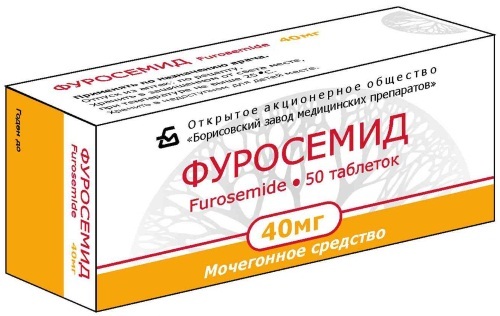
- Calcium gluconate. The drug contains calcium gluconate. It goes on sale in the form of a solution for intramuscular / intravenous administration and tablets. The use of medications is indicated for calcium deficiency caused by renal failure. The active ingredient is characterized by anti-inflammatory, hemostatic, antiallergic and detoxification effects. Calcium gluconate should not be taken by people suffering from sarcoidosis, nephrourolithiasis, atherosclerosis, hypercalciuria. The course of application of the drug varies within 3-7 days. The dosage regimen is selected individually.
- Sodium chloride. Sodium chloride is marketed in the form of an infusion solution. The drug has a rehydrating and detoxifying effect. It is indicated for sodium deficiency provoked by acute renal failure. The use of the drug is contraindicated in people suffering from cirrhosis, heart failure and arterial hypertension. Pregnant, breastfeeding women and the elderly may need to adjust the dosage regimen. The solution is administered intravenously (mainly by drip). The duration and rate of administration is selected by the doctor depending on the phase of the pathology and the patient's age.
- Methylprednisolone. Synthetic glucocorticosteroids can be included in the drug therapy for acute renal failure. This category of medicines includes Methylprednisolone. The drug has an immunosuppressive, antitoxic, desensitizing, anti-inflammatory and anti-shock effect. You can not use a synthetic hormone for people suffering from periarticular osteoporosis, arthritis, aseptic necrosis, tuberculosis and diseases of the immune system. The solution is administered intramuscularly or intravenously. You can buy Methylprednisolone in tablet form at the pharmacy.
-
Veroshpiron. The drug is marketed in the form of tablets and capsules. A potassium-sparing diuretic contains spironolactone, which acts as an active ingredient. Veroshpiron is not prescribed for people suffering from Addison's disease, hyponatremia, hyperkalemia, hypercalcemia, diabetic nephropathy and diabetes mellitus. It is necessary to use the drug only as directed by a doctor in an individually selected dose.
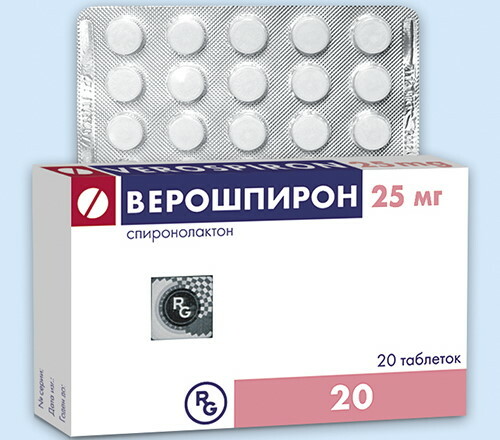
Verospiron tablets
It is strictly forbidden to independently select drugs. Acute renal failure is an extremely dangerous condition. Taking some medications uncontrolled can make the situation worse.
Procedures
In severe cases, with acute renal failure, patients are prescribed hemodialysis.
The procedure allows you to cleanse the blood from toxins:
- excess electrolytes (calcium, potassium, sodium);
- alcohol (ethyl, methyl);
- medicinal substances (tranquilizers, sleeping pills, barbiturates, salicylates, sulfonamides, iodine or bromine compounds);
- poison (strontium, arsenic, mushroom poison);
- creatinine;
- urea.
The device consists of several parts, each of which performs a specific function:
- dialyzer filter;
- filtration controller;
- blood leak detector;
- temperature controller;
- a system for mixing concentrates and water;
- air removal system;
- venous and blood pressure sensors;
- a pump that delivers heparin;
- a pump that pumps blood.
Venous blood is fed into the machine and passed through a membrane filter. During the procedure, molecules of water and toxins are removed from the body. The dialysate is selected individually. Hemodialysis is prescribed during life-threatening conditions. The procedure helps to restore electrolyte levels and maintain acid-base balance
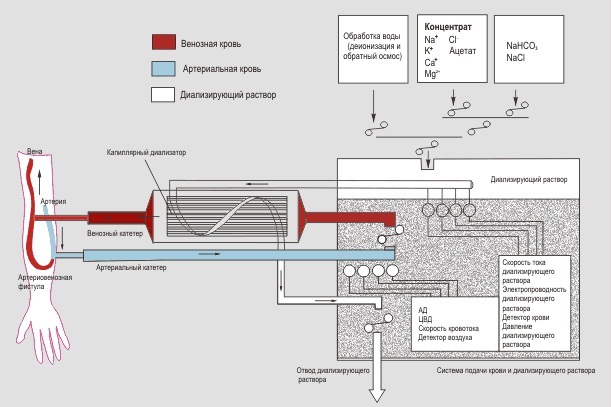
Hemodialysis is usually performed in a hospital. The procedure takes 3-5 hours. In acute renal failure, provoked by pyelonephritis, glomerulonephritis, usually 1-2 procedures are enough to stabilize the woman's condition.
You can not prescribe hemodialysis for:
- chronic heart failure;
- the growth of a tumor of a malignant nature;
- schizophrenia;
- psychosis;
- epilepsy;
- stroke;
- sepsis;
- endocarditis;
- diseases of infectious etiology.
Patients over 70 years of age are not prescribed hemodialysis.
Diet
In addition to drug therapy and hemodialysis, patients with acute renal failure are shown a strict diet. First of all, you need to limit the amount of salt consumed (per day - no more than 4 g) and protein (per day - no more than 80 g). It is strictly forbidden to consume fresh herbs, which contain a large amount of essential oils (onion, garlic, basil, parsley, dill, celery).
An important condition is compliance with the drinking regime. You can drink no more than 1 liter of liquid per day.
The diet should contain fresh vegetables and fruits that can have a diuretic effect:
- melon;
- watermelon;
- prunes;
- dried apricots;
- dried apricots;
- raisin;
- apricots;
- beet;
- zucchini;
- cucumbers;
- pumpkin.
Meals should be fractional and balanced. Food should be taken 4-5 times a day. Chocolate, spicy, salty, sour foods, cocoa, coffee and black tea should be discarded. 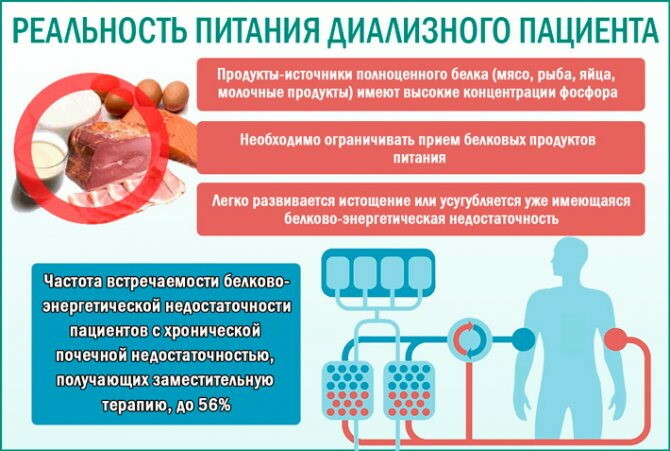
The list of approved products includes:
- oils - sunflower, olive, corn, unsalted butter:
- meat - turkey, chicken, rabbit, veal, lean beef;
- dairy products - cottage cheese, yogurt, yogurt, sour cream, cream, kefir, low-fat milk;
- spices - dried dill, caraway seeds, cinnamon, dried parsley;
- sweets - marshmallows, sweets, jellies, preserves;
- cereals - rice, millet, pearl barley, corn, semolina, buckwheat, oatmeal;
- dried fruits - dates, apricots, dried apricots, raisins;
- fruits - apples, peaches, nectarines, melons, bananas, apricots;
- vegetables - pumpkin, tomatoes, beets, carrots, potatoes, cauliflower, zucchini.
Products from the list of approved products can be boiled, stewed, baked and fried. It is better to refuse store-bought seasonings. Dried herbs are used to improve the taste of dishes. Deep fat should also be discarded. It is strictly forbidden to use canned food, fatty meats and fish, ready-made sauces.
Possible complications and consequences
Acute renal failure, in the absence of adequate treatment, can lead to the death of a woman. The severity of symptoms directly depends on the stage of the pathology. In the absence of adequate treatment, in acute renal failure, the risk of developing anuria is high.
This condition is life threatening. Anuria is often accompanied by hypernatremia, hyperkalemia, azotemia, hyperphosphatemia, acidosis. Patients develop vomiting, nausea, and uncontrolled diarrhea. A woman becomes weak, at any moment she can fall into a coma. Against the background of anuria, gastroenterocolitis also develops, accompanied by internal bleeding and pericarditis.
With oliguria, salt and water load from above can develop. This condition is characterized by muscle weakness and increased heart rate. An increase in the concentration of potassium to a critical level can provoke cardiac arrest.
Complications that develop in acute renal failure also include sepsis. A purulent infection is accompanied by apyrexia, yellowing or blanching of the skin, the occurrence of herpetic eruptions, fever, tachycardia. Often, the condition is complicated by cardiomyopathy, heart failure, and myocarditis.
Acute renal failure in women can develop for various reasons. The severity of symptoms directly depends on the phase of the pathology. When the first signs of acute renal failure appear, you should immediately consult a doctor.
Acute renal failure video
Acute renal failure. All about the causes of insufficiency:



